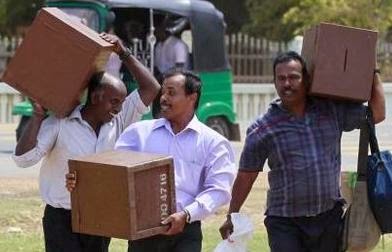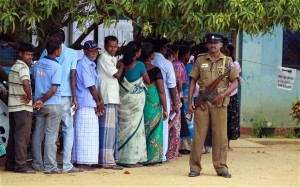 |
| Ballot boxes for PC elections ( The Hindu) |
”If the Opposition is to amount a serious challenge to the Rajapaksas at national elections, it must become more active, more rooted, socio-economically and less fractious. The UNP remains the single largest opposition party (though with a much reduced vote-base); the JVP and DP are in a dead-heat for third place. What is necessary is the broadest possible opposition coalition, which includes the TNA and other minority parties, stands up for all victims of Rajapaksa misrule and opts to focus on political-social-economic distress rather than on patriotic chest-thumping. ”
Two Verdicts on Rajapaksa Rule by Tisaranee Gunasekara
“Despots rely on elections not as a means of expression but as an act of acclamation. A dictator certainly does not go to the electorate for a mandate; he believes he already has one”.
The Guardian (7.12.2011)
Geneva: A Necessary Defeat
The Geneva resolutions would not have happened if the Rajapaksas did not depart from democratic norms so blatantly and consistently, post-war. The call for an international investigation would not have gained traction if the Rajapaksas did not undermine, debase and subjugate every Lankan institution, from the judiciary and the elections commission to the military and the human rights commission.
 |
| File Photo |
After the impeachment travesty, can any objective observer believe in the possibility of an independent national inquiry into anything?
Less than 48 hours after the adoption of the US resolution on Sri Lanka, the UNHRC overwhelmingly approved five resolutions against Israel. And the US, the sole global hegemon, could not persuade a single UNHRC member to vote against the anti-Israeli resolutions, not even the UK. Of the 47 member-states, 46 voted for the resolutions, with only the US voting against . So much for the lie that the UNHRC is an imperialist pawn or that it can be manipulated by the US or that Navi Pillay is an American agent!
The US resolution on Sri Lanka succeeded not because of American power but because of undeniable and continuing crimes by the Rajapaksas against their own people.
Of the third world countries which supported the resolution only one, Botswana, can be considered an American ally. Benin may have voted for the resolution because its president is an evangelical Protestant (Perhaps the BBS et al can take a bow?). Apart from Cuba, every South American member-state of the UNHRC voted for the resolution and none of them are American-stooges. On the contrary, all those countries are ‘Pink-tide nations’ with left or left-of-centre governments. They would have voted for the resolution because they saw certain similarities between their own autocratic pasts and Rajapaksa Sri Lanka. For many of those countries despotic populism was a lived-reality, a part of their own nightmarish histories. That sense of déjà vu would have been solidified by such quintessentially Rajapaksa deeds as the arrest of Ruki Fernando and Father Praveen (even as the council was debating Sri Lanka) and the continued detention of Jeyakumari Balendran, plus the sudden desperate attempt by the regime to resurrect the dead-Tiger in order to justify the latest wave of repression.
Colombo could have avoided the independent international investigation at least for one more year if the promised national inquiry into allegations of torture, post-war, materialised. In characteristic Rajapaksa style, the regime made the promise in time for the Commonwealth Summit and reneged on it, once the summit was over. As Navi Pillai pointed out in her report to the UNHRC, “In November 2013, the Government announced that the Human Rights Commission of Sri Lanka would conduct a national inquiry into allegations of torture committed between 2009 and 2013, with the support of the Human Rights Division of the Commonwealth Secretariat. In early December 2013, the Commission announced that the inquiry had been postponed indefinitely.”
Blatant breaches of faith such as these would have done more to convince UNHRC member-states to support the resolution than anything the US could have said or done.
The UNHRC investigation is to cover the period from 2002 to 2009. Consequently, it would be an excellent opportunity to expose the anti-civilisational deeds of the LTTE, from child-conscription to the wanton murder of unarmed political opponents. But for the Rajapaksas this too would pose a problem because the senior-most Tiger leaders still alive have transformed their loyalties from the Sun God to the High King. After all, one of the counts on which Ms. Pillai faulted Colombo was its failure to indict “any LTTE suspect for alleged war crimes or other human rights abuses”!
The Geneva vote is a moral-political defeat for the Rajapaksas. It is a necessary and a welcome outcome not just from a Lankan but also from a Sinhala-Buddhist perspective. Left to their own devices, the Siblings will do to Sinhala-Buddhists what the Tigers did to the Tamils (the creation of the BBS constitutes an early warning). Given the nature of the UN system, the investigation cannot result in either a war-crimes trial at The Hague or UN sanctions on Sri Lanka. (Individual countries can impose travel and asset bans on Rajapaksas/officials but this can be done without any UNHRC investigation as the Magnitsky Act demonstrates .) UN trials and sanctions require Security Council approval. Since the Rajapaksas can count on Chinese and Russian vetoes for a long time to come, they, like Israel, can escape with a moral drubbing.
The Absent Anti-Geneva Wave
Respectable electoral victories with simple majorities are not enough for the Rajapaksas. They want gigantic wins to bolster the conceit that they and, they alone, represent the ‘nation’, in perpetuity.
The PC polls were expedited for the same reason – because the Rajapaksas expected an anti-Geneva Sinhala-Buddhist wave and wanted to benefit from it electorally. The results indicate that this majoritarian/patriotic surge existed only in the imagination of the Ruling Siblings.
Comparing the PC polls results with the results of the 2011 Local government polls is the most effective way of understanding the changes in public mood . Despite a blatantly partisan electoral process, including a toothless Elections Commissioner (who was unable to protect even his own assistant commissioners from government thugs ), a totally Rajapaksaised police, a subjugated bureaucracy and a cowed media, despite gross violation of state power and state resources, the regime failed to maintain its 2011 vote levels, let along improve it via the much-hyped (and ultimately non-existent) anti-Geneva wave.
Table I – UPFA Performance in the South
|
UPFA
|
Southern Province
|
Galle
|
Matara
|
Hambantota
|
|
LG polls 2011
|
60.03%
|
59.6%
|
61.7%
|
58.7%
|
|
PC polls 2014
|
58.06%
|
57.6%
|
59.71%
|
57.42%
|
|
Difference
|
-1.97%
|
-2%
|
-1.99%
|
-1.28%
|
Table II – UPFA performance in the West
|
UPFA
|
Western Province
|
Colombo
|
Gampaha
|
Kalutara
|
|
LG polls 2011
|
56.1%
|
53.1%
|
59%
|
56%
|
|
PC polls 2014
|
50.3%
|
45.33%
|
57.98%
|
61.23%
|
|
Difference
|
-5.8%
|
-7.77%
|
-1.02%
|
+5.23%
|
The UPFA average vote decreased between 2011 and 2014 in Galle, Matara and Hambantota districts. Provincially, the UPFA vote decreased by 2%, from 2011 to 2014.
The UPFA vote decreased in Colombo and Gampaha districts but increased in Kalutara district. Provincially, the UPFA vote decreased by a very substantial 5.8% between 2011 and 2014.
There is no patriotic-wave lifting the Rajapaksa boat. There is no anti-government wave either. The electorate is moving away from the government, but very slowly. If the Opposition is to amount a serious challenge to the Rajapaksas at national elections, it must become more active, more rooted, socio-economically and less fractious. The UNP remains the single largest opposition party (though with a much reduced vote-base); the JVP and DP are in a dead-heat for third place. What is necessary is the broadest possible opposition coalition, which includes the TNA and other minority parties, stands up for all victims of Rajapaksa misrule and opts to focus on political-social-economic distress rather than on patriotic chest-thumping.
References;
https://www.middleeastmonitor.com/news/americas/10596-unhrc-passes-five-resolutions-on-israel.
According to Wikipedia, the UNHRC has passed 45 resolutions against Israel since its inception in 2006 till 2013.
When former UN Advisor on Sri Lanka, Yasmin Sook says that sanctions are possible, this is precisely what she talks about – sanctions by individual countries and not the UN proper. Similarly though no Lankan political or military leader can be taken to The Hague even if faulted in the UNHRC report, the US is perfectly within its rights to try Gotabhaya Rajapaksa in an American court so long as Mr. Rajapaksas clings to his US citizenship.
People vote differently at national and non-national elections and 2011 is closer than 2009.
http://www.island.lk/index.php?page_cat=article-details&page=article-details&code_title=100667
– Sri Lanka Gaurdian
